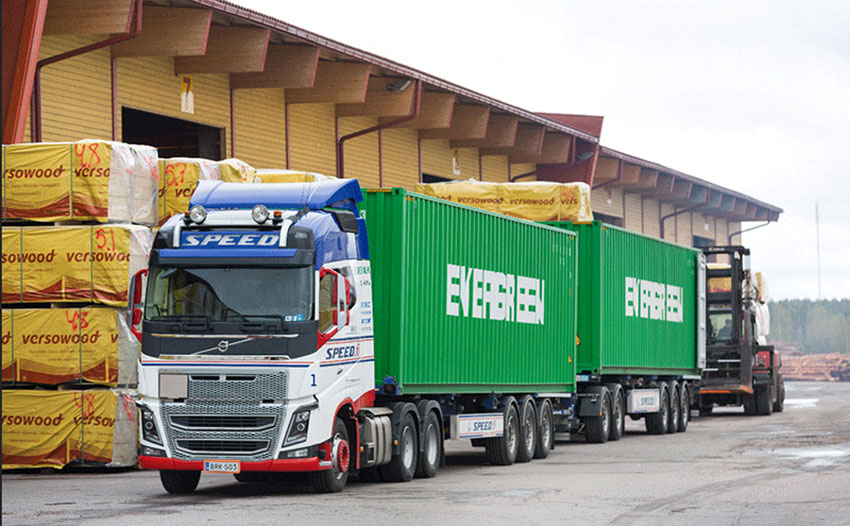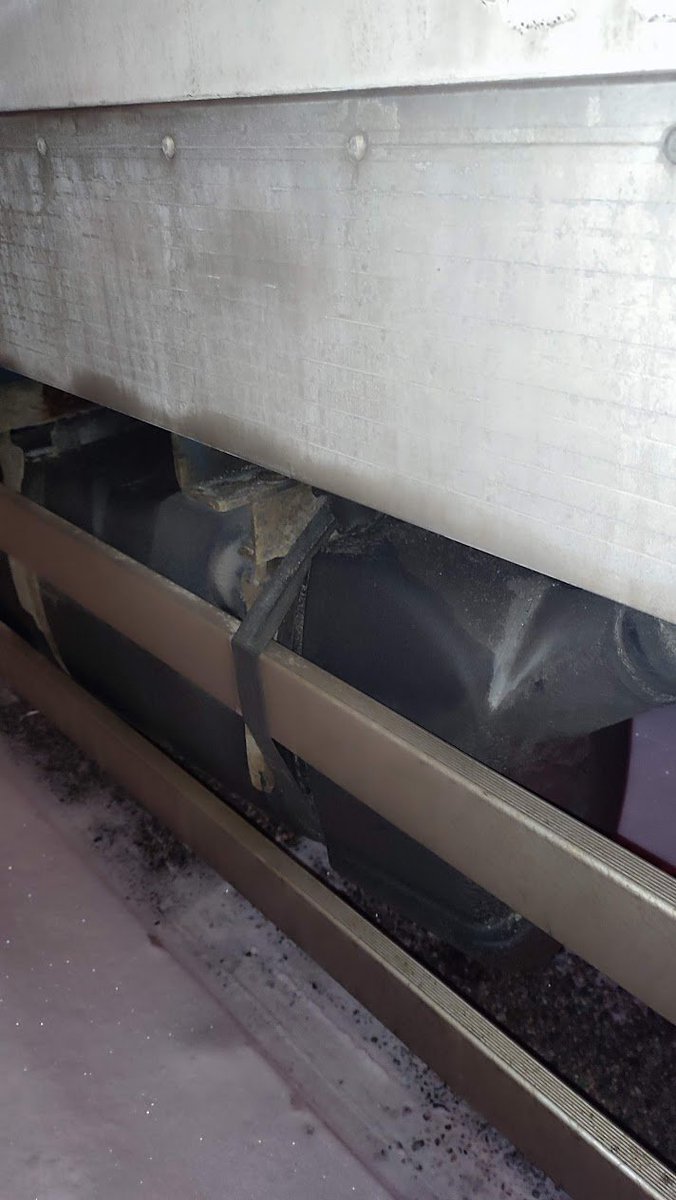
When I lived in Britain, the drivers were sharing tips with each other: “do go work for this company, you can earn good money there, as there is plenty of overtime”. I even saw a discussion on UK trucking subreddit today when a young guy is asking about becoming a trucker and they say to him “only way to make money is tramping, when you live in your truck Monday to Friday”.
Another discussion I saw recently concluded that the only way making money in trucking is to do nightshift distribution work, clocking 12 hour shifts every night.
All while Britain struggles with a shortage of truckers and people are struggling to pay their rent or bills.
I started a new job in Finland this week and I have to say it’s an eye-opening perspective. First surprise was that people find my British experience impressive, even though in the world of wide, snowy roads and 32 metre long trucks with two trailers, my years of driving the single track roads of Scottish highlands in a small rigid gave me very few skills that are relevant here. This is such a stark contrast to my experiences in Britain where the experience is often completely disregarded unless it was gained in Britain.
I never forget my first ever job interview in Scotland. I applied for a job in which I was to shunt rental cars between company parking and Edinburgh airport. (This was before my lorrying days). The interviewer asked me if I have experience in “driving in big cities, navigating busy traffic and parking in tight spaces”. I said yes, that my home town of Wrocław is more than twice bigger than Edinburgh. They said they meant cities more like London. I said, “ah, if you mean European capitals, I drove in Warsaw, Prague, Paris, Budapest, Vienna, Sofia, Zagreb, and while I have never been in to Ankara, I drove in Istanbul for a few days”.
The guy was impressed and asked me about how it is to drive in Turkey. We chatted for about 15 minutes about that. Then he said “that’s amazing”, but then looked down at his notepad and asked “but you were never in London?”. And because I never drove in London, he just made a sad face and marked something, saying “that’s a NO then”. (FYI: Driving in London is quite relaxing comparing not even to Istanbul but even to Paris or Warsaw a couple of decades ago…).
I can give many examples of similar situations, but I just wanted to use that one to illustrate that mentality: unless something is British, it’s irrelevant.
Finns are the opposite of that. During my interview I was perfectly open about my lack of experience in this specific kind of job, but they seemed to be still open, believing that if I can do x, I will be able to learn y, too.
Anyway, the Finnish company (a medium-sized logistics company operating in chilled and frozen food distribution market) offered me a job and so I am starting. I had quite a few jobs in Britain (I was an agency driver for many years) and I am used to that you come to work on your first day, you have the paperwork thrown at you and told to go. You need to work everything out yourself. When the driver shortage came, I met several drivers who dumped their bus driving jobs to get behind the wheel of the trucks, and they were out and about without even being shown such basic things like how to operate the pump truck or how to use the ratchet strap to secure their loads. Here, we sat down and we discussed with details what kind of equipment I used before, so the company knows exactly what kinds of trucks I can drive, if I handled goods on pallets before and what kind of equipment I was using to do so.
Even though the job itself is familiar to me (I used to work for Co-op over a decade ago, but just using 6-wheelers and not artics) they scheduled a week for me to go out with a driver who works for the company for some time already, so I become familiar with the company’s customers, regular routes and, in general, the ways things are done here.
And I really like the way things are done here. All my trucking life in Britain was about moving heavy pallets with the pump truck, so when I heard that drivers are supposed to load their trucks themselves, I was not too thrilled. But in EVERY. SINGLE. PLACE. we were this week there are electric pallet trucks provided for drivers to use. Every place we’ve been has (clean!) driver toilets. Even though the job is time critical, as it always the case when handling perishable goods, the routes are scheduled with sufficient margins of time, so we always have time to stop for a coffee or grab a snack in the roadside garages so the job is actually pretty laid back. (And don’t even start me on the quality of roadside infrastructure for truckers, I have twitter threads and a podcast about it already!).
Enough to say all but one of the garages around Helsinki we’ve been to this week, even those that barely have a space for four or five trucks to park, have free toilet, a small cafe and a shower (has not enquired if you pay for a shower yet).
My co-driver for this week was a Finnish girl in her late 20’s. Very nice, helpful and skilled driver. Just to say we both had trouble reversing to bays – me, because this is something I rarely had occasion to do before, and her, before, as she kept complaining, this truck is “too short and bends awkwardly” – she is used to driving typical Finnish trucks where the semi-trailer is actually pulled on a dolly behind a full-size rigid lorry like here (25.25m length) and here we were given a standard, 16.5 metre long European artic:


We also joked that she is spoiled for space: she uses about twice as much space as I do for every manoeuvre – which is not a problem, as Finnish distribution centres are tailored for longer, Finnish trucks (which now can pull two full size trailers and be over 30 metres long).

But what really touched me is when we spoke about our everyday lives. She is in her late 20s, she had a kid with her boyfriend, also a lorry driver; they bought a house with a decent piece of land on the outskirts of Helsinki a couple of years back without help from anyone. They drive two cars that not many managers of the British transport companies I know could afford, and they take full advantage of their 5 weeks holidays to travel the world.
If I tell my British friends that in Finland a couple of truck drivers in their 20s can buy themselves a home and don’t have to eat Tesco loaf with the cheapest strawberry jam for 15 years to be able to afford their deposit, they are going to cry. And yet, here it is.
My co-driver seems very happy with her life. She says the job is not stressful at all, the company is taking good care of her (especially when she was pregnant), she has a good work-life balance and she enjoys what she does. Ah, and did I mention that she is a graduate of a vocational school of logistics profile, so her training was all paid for by the state; she just had to pay for her exams and some other fees like having her license issued etc. The total cost of her truck driving licence and professional qualification was like 160 euros.
She also got some other skills like driving a forklift and got a brief training with some other machinery, like snowplough or wheeled loader.
I really enjoyed our week together, she was a great company, but also we had very eye-opening conversations. She seemed shocked to hear some of the things I told her about British trucking industry (like that it’s normal for people to do tramping jobs and be on the road all week every week with occasional Saturday thrown in). Apparently, trampers in Finland have every second week off or something .
I would gladly continue working together with her, as I was learning so much – more about Finland than about the job itself, but ALAS, it’s not going to happen. We are done. Why? Because our shifts run a bit longer than usual (on Tuesday we worked almost 11 hours!) so we clocked our contracted 40 hours already and therefore we both have Friday off. And from Monday onwards we share the truck, but working opposite shift (she’s on early mornings, I’ll be doing the backshift) so I’ll only see her in passing.
So what is the take away I want to convey with that over-lengthy thread?
When I speak to my Scottish trucking friends or read British trucking forums, I hear that the only way to make money as a trucker is to “put our hours in” and being a truck driver is a career for someone who is not too interested in having private lives. I was lucky enough to be able to drive for only three days per week usually, but that was still very tiresome – three long shifts, often with a lot of manual labour.
My colleagues were all working full time, doing the same work that was exhausting for me Wednesday to Friday for five or even six days a week. Week after week after week after week. And then coming home to raise kids, take care of their elderly parents etc.
They all believe that “putting in all the hours” is the only way to make a living as a truck driver. And unfortunately they are right. Because that seem to be a case.
In Britain.
Disclaimer: It’s not all good in Finland, of course. As some of my followers might be aware of, this is my second job in Finland. The first turned out to be a total disaster: the company’s trucks were in very bad technical shape and when I reported some issues, I was told (P.S.1) it’s due to low temperatures or winter conditions etc. I gave them some credit of trust when the explanation seemed possible to be true, but left on the spot when they wanted me to go to Denmark with a trailer that had a diesel tank secured only with a rotten strap:

I quit on the spot and I am now struggling to get them to pay me fairly for all the hours I did for them. But I have a fairly believable impression that this is an exception and not a rule. Why? Because when I went to trade union for advice (trade unions are STRONG here), on hearing the company’s name, they raised their hand and said “we don’t need to hear anymore”.
Also during my most recent job interview I was asked if I worked somewhere since I came to Finland. And I mentioned I did briefly work elsewhere but because of “difference of opinion in the matter of acceptable standards of vehicle maintenance” we had to part ways abruptly and did not wanted to provide company name, but from that and some other clues the interviewer guessed the company name and when I confirmed it, he exclaimed “OH MY GOD!” and exchanged some meaningful looks with his co-worker. So I guess if this company I had a misfortune to start my adventure in Finland is famous for the wrong reasons, then it’s rather an exception than a rule here.
Originally tweeted by Tomasz Oryński (@TOrynski) on 26/01/2023.




